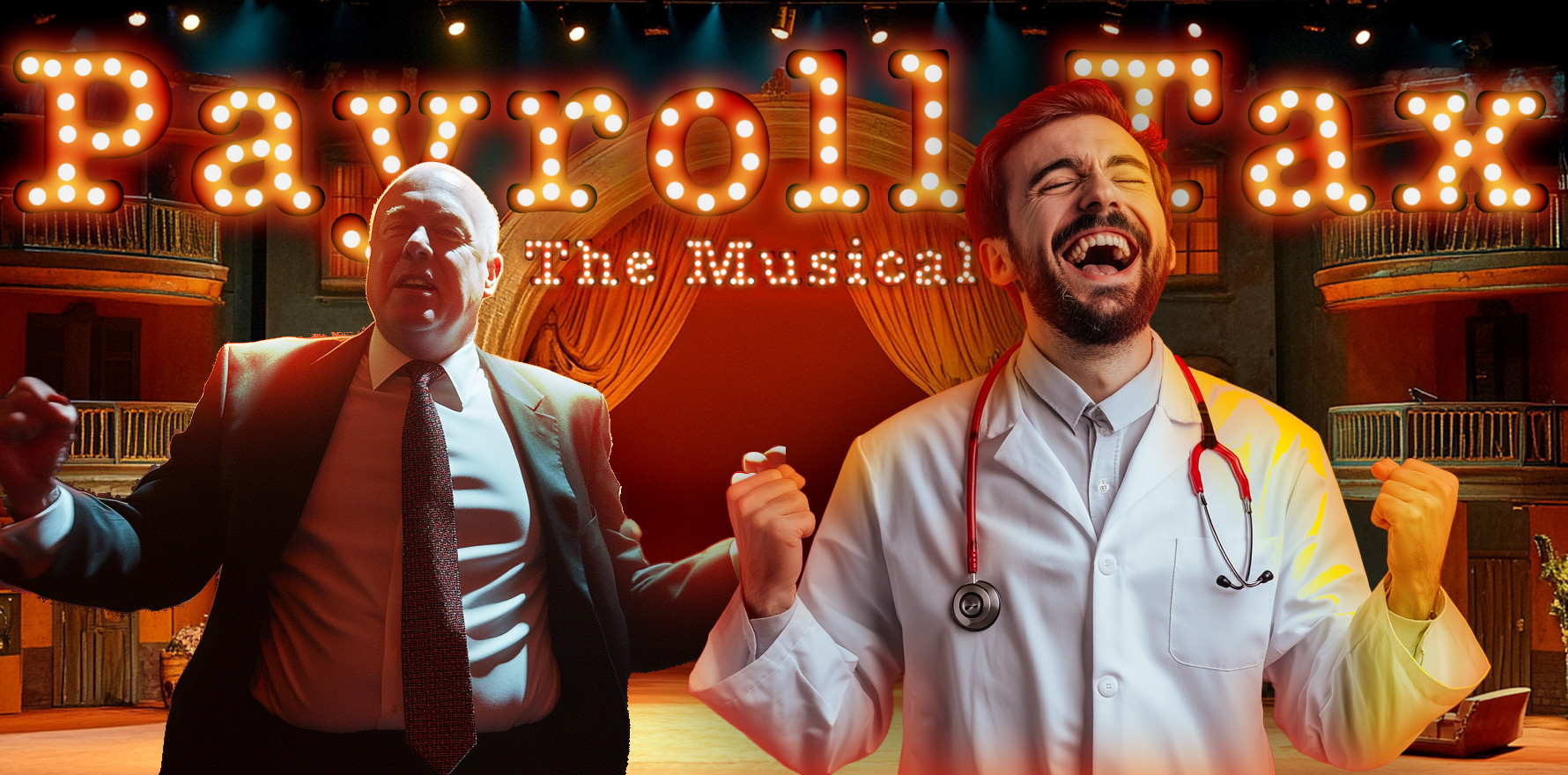Although seemingly innocuous, this week’s SA payroll tax legislation is a landmark for how we’ve sleep-walked into a dumb place, one which might be harder to extract ourselves from than a Trump reciprocal tariff.
If you think we obsess way too much about payroll tax at The Medical Republic, you don’t know the half of it.
This week while doing our story on the possible implications of SA finally putting their payroll tax words into action by way of legislation, our deputy editor Holly Payne admitted to me that she’d had a dream – I think we could safely call it a nightmare – in which David Dahm – a well-known tenant doctor structure advocate and payroll tax protagonist – wrote and produced a payroll tax musical.
The plot was that there was a GP who was like a king in his state, and who had two GP sons.
One of them followed the enlightened path of ensuring that his practice arrangements were a true tenant/landlord contractor model while the other son had a sham arrangement. We don’t know at the start of the production if this son even understands his arrangement is a sham.
It looked on the surface like the tenant/landlord set up, with things like better worded contracts and payment flowing first to the doctors, but when you scratched the surface – as state revenue offices love to do behind the scenes in private audits – his structure doesn’t pass muster.
You know what happens.
The lazy son gets caught by both his local state revenue office for being payroll tax liable and later the ATO for having deemed employees and getting into that mess as well (GST, superannuation, taxable contractors as employees, you know the story).
One thing the lazy son didn’t do was register with his local SRO and give up all his data in exchange for an amnesty, which would have at least got him some proportional payroll tax relief (he did a fair bit of bulk billing which the SRO liked), but more importantly, would have given him protection against a five-year back audit.
Alas, this son was trying to play both sides. He didn’t want to lift the bonnet on his structure to his SRO because he was worried that if he did he was going to be beholden to that SRO and by default, the ATO forever – a bit like a small southeast Asian country that gives in to Donald Trump on an outrageous and bullying tariff demand and is forever stuck with a very unfair trade deal with the US.
The good son is safe because he had decided a while back to restructure properly and run a true tenant/doctor model.
It’s a family tragedy of course in the mode of King Lear. One son is successful and has options, happily running the equivalent of a shopping centre service for doctors, where the doctors, being truly independent GPs getting a service to do their own thing are surprisingly happy.
They even managed independently to get together and practice forms of team care on behalf of patients. This son had no problems attracting quality tenants to his business because his centre was seen as a safe harbour for tenant doctors from the tax authorities, and his business has good resale value.
The other son is ruined.
The King (dad) feels like he’s failed as his sons are doomed to fight the rest of their lives and one is bankrupted, a bit like the dad in this season of The White Lotus.
In Holly’s dream (I’m not making this up) the Sydney Morning Herald pans the opening night of this new musical big time and the whole production subsequently flops.
David Dahm remains philosophical and typically stubborn, and starts thinking about the possibility of an ATO-based musical (I did make this bit up).
At this point Holly woke up in a cold sweat (again true). When she told me all this I realised immediately that we potentially had a serious underlying human resources issue at the company.
What are we doing here to give our journos nightmares like this?
Please don’t write in with suggestions or theories, we know.
At least our journos aren’t GP practice owners struggling to work out how to provide the right business structure for GPs to work in with all the problems that can potentially create.
If our journos are having nightmares, you can imagine how stressful and life altering what has gone on in the realm of payroll tax and continues somewhat unabated might be doing to an owner and any GPs in practices that are in the same potential grey zone that the King’s lazy son ended up in.
Anyway, Holly exorcised her obsession in what I think is a very healthy manner and used the magic of AI to create a headline song for the musical. It’s called The Doctor’s Dilemma, and you can find it here.
The chorus goes like this:
Oh payroll tax it’s a sneaky beast
Nibbles at the edges till your cheque’s deceased
Doctors with their jargon and an expensive show
The wallet screams stop but the payments flow
If you’ve read this far and clicked on that song I imagine I’ve lost you for the time being. But the point I think is worth making about SA passing their legislation this week, so I’ll try my best to be quick as it’s important.
On spec the legislation is just doing what the SA SRO said they’d do: implement their own warped interpretation of trying to blackmail practices to do more bulk billing in the interest of a state political agenda, even though states don’t have anything to do with how GPs are actually remunerated, albeit they’ve inserted themselves Trump tariff-like into the transaction in an attempt to wield influence via tax.
But the legislation points to something quite sinister for general practice and it’s very likely that when the Victorian legislation comes around the same thing is going to happen.
That is, the legislation very clearly divides the South Australian GP community into those practices that have given in to the SRO threats and submitted their data to the SRO in exchange for a guarantee of no back audit and those that haven’t.
It is estimated that 60% have and 40% haven’t.
If you’re in that 40% and you don’t have a true and well-constructed tenant/landlord structure, then the SRO can now audit you for five years backwards, which for most practices would be ruinous.
Holly’s two sons of the king in her Shakespearean musical immediately come to mind.
Ones who can be ruined – and even if they aren’t – now will live a life of anxiety and stress, unless they can get themselves to a defendable position on structure before they get an audit. Even then, a back audit can happen for past structure.
The others have done the Trumpian deal and agreed to pay a certain amount of payroll tax in exchange for questionable protection. If that sounds like I’m framing it as a “protection racket” of sorts, it’s because I am.
The problem, of course, for those 60% who have given in and signed up to effectively say, yes, take us, we aren’t payroll-tax compliant, is that while they are going to get out of any back audits, and potentially pay less payroll tax if they bulk bill enough, they are trapped by two big future potential issues:
- They have far less control over their destiny because they’ve agreed to terms and conditions on bulk billing, terms that the state government can and likely will change the goal posts on moving forward to suit their political agenda;
- If you sign up for the SRO deal, you are waving a giant red flag to the ATO that your practice doesn’t actually run contractors but runs “deemed employees”. The rulings on deemed employees are only recent but there is plenty of reason to believe that the ATO will start moving on these rulings with obvious businesses that don’t comply in the not-too-distant future. Practices that put their hands up and say “we give up SRO, we’re in your hands” are a hard and identified target for the ATO to start on their deemed employee campaign. Remember, the ATO does not like contractors because they don’t pay as much tax. They love to think your contractors are actually employees.
Does this mean you made the wrong decision being one of the 60% who gave yourself up early in the piece in SA or Victoria?
Not at all.
Related
There is no good way to go for practices unless you happen to be one of what looks like the rare and lucky ones who actually run a well-constructed tenant/doctor model.
You are literally damned if you do and damned if you don’t, which is why what the state governments are doing in Victoria and SA is actually sinister.
The SROs aren’t helping general practices at all, but putting them in an impossible position, setting them up to be in conflict with each other (like the King’s two sons) and taking a newly invented tax clip on the way through.
It’s possibly the worst state legislation for our healthcare system in the history of state and federal healthcare law.
Interestingly, Queensland’s legislation does not require practices to sign up formally and leave themselves this exposed to the future whims of a state government or, perhaps most relevantly now, the ATO.
The legislation is blanket: if you’re a genuine GP practice, you don’t owe payroll tax, full stop, and you don’t have to write in to admit your structure is wrong so the ATO can pick you out of an SRO-provided lineup later.
That’s much better than Victoria and SA of course, but there’s still a problem here. If Queensland practices are lulled into the idea that payroll tax is their only tax problem if their structure isn’t quite right and that’s now sorted, then it feels entirely feasible that the ATO might be waiting in the wings with the next set of tax challenges, boogey-man like.
David Dahm did a detailed webinar on the whole schemozzle this week (here) which put the potential dilemma for practices eloquently by asking attendees if they wanted to play chess with SROs and the ATO, or snakes and ladders.
He argues that if you want to play chess and have watertight ways of outplaying your competitor you need to think about a true tenant/landlord structure. Mr Dahm doesn’t say that getting to that structure is particularly easy or cheap which has been part of the problem, but he does guarantee (literally I think) that if you get the detail right, you can win on all fronts as far as tax is concerned.
He says that at the moment a lot of practices are choosing to play what is effectively snakes and ladders.
Classically, that might even include a lot of practices in Queensland, which have breathed a big sigh of relief at their state’s payroll tax legislation and gone back to day-to-day work, without changing anything in their structure.
Mr Dahm thinks this might be classic snakes and ladders. A lot of Queensland practices have just climbed a big ladder and they are now on that part of the board where there are not going to be any payroll tax snakes left before the end of the game.
But Mr Dahm would say there’s a lot snakes to navigate still if you have subcontractors who look like “deemed employees” to the ATO.
In other words you might be clear of payroll tax in Queensland or part clear in SA and Victoria (both states are still going to collect a lot more from GP practices who sign up than they did prior) and also clear of a back audit, but you’ve very likely got some big ATO snakes to navigate before you get to the end of the game.





